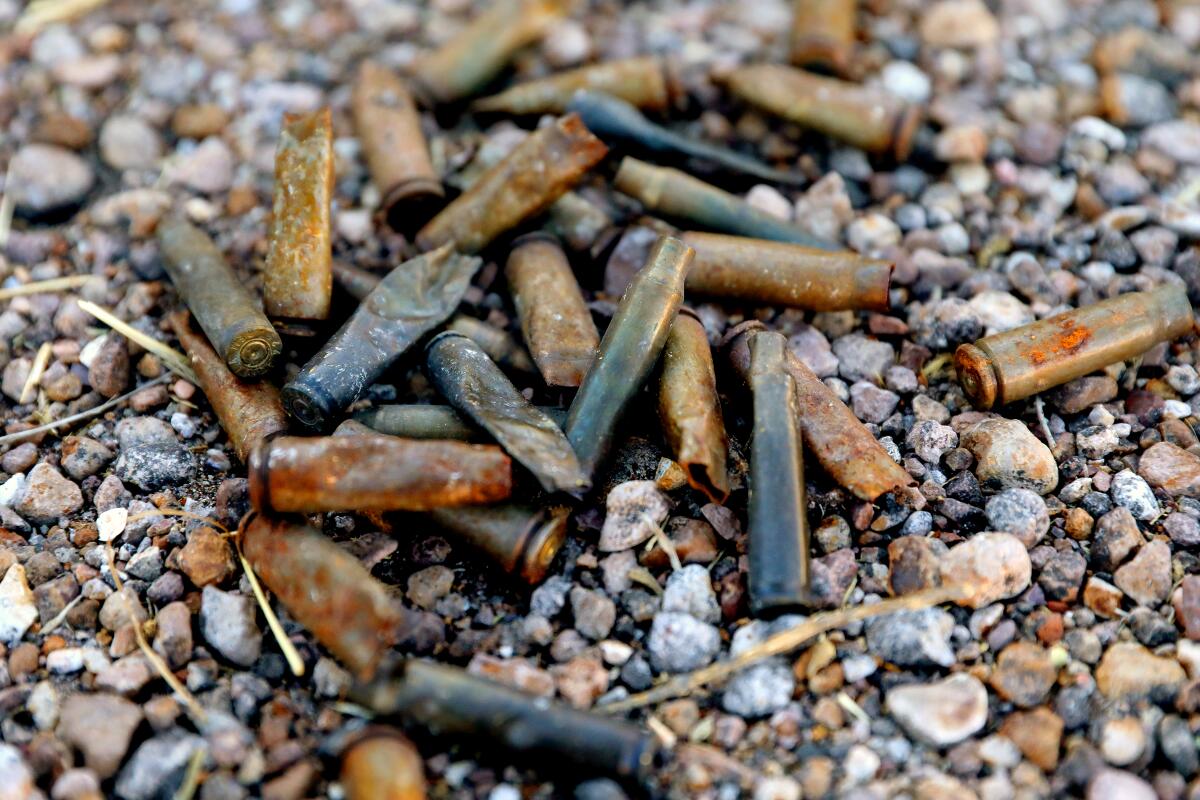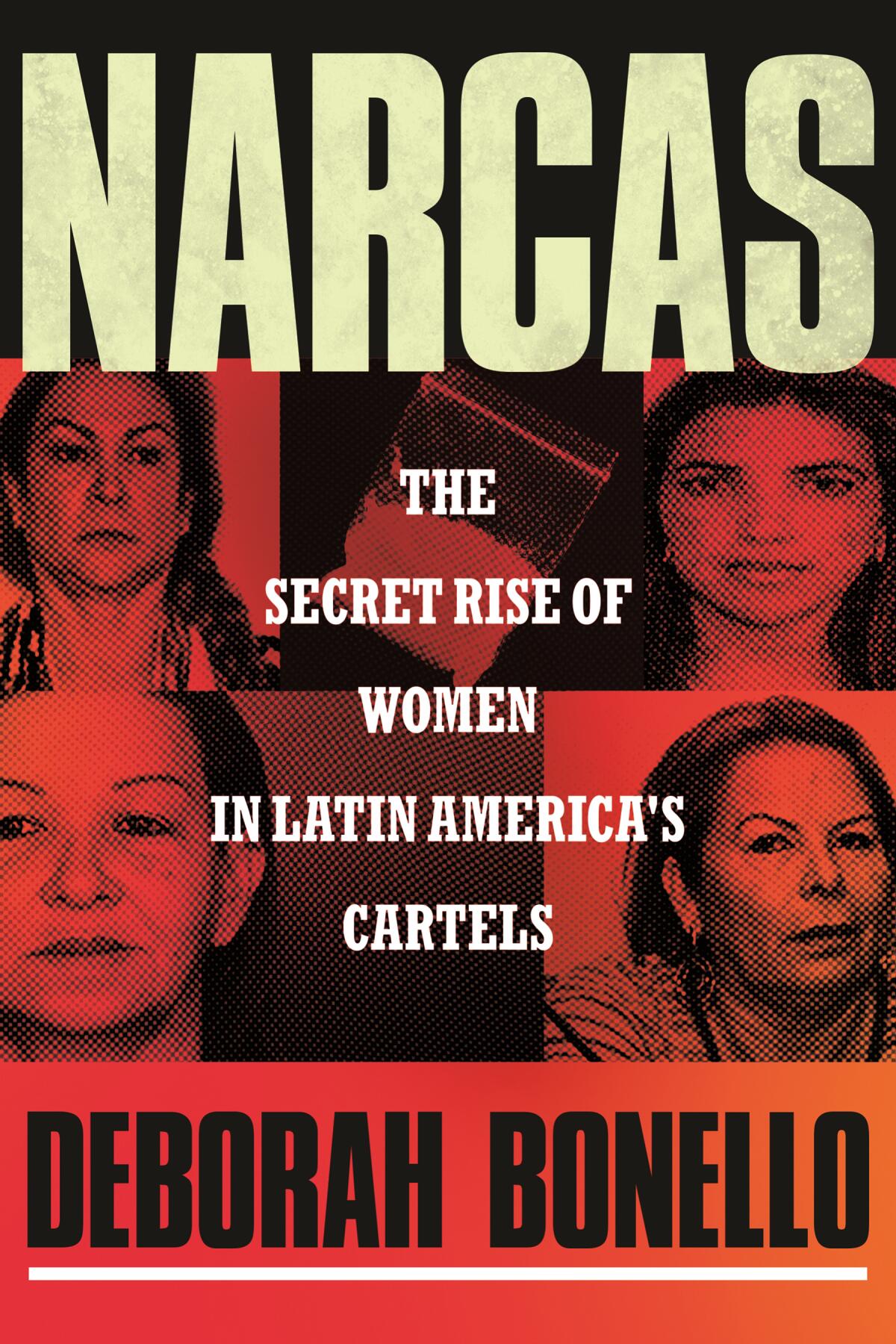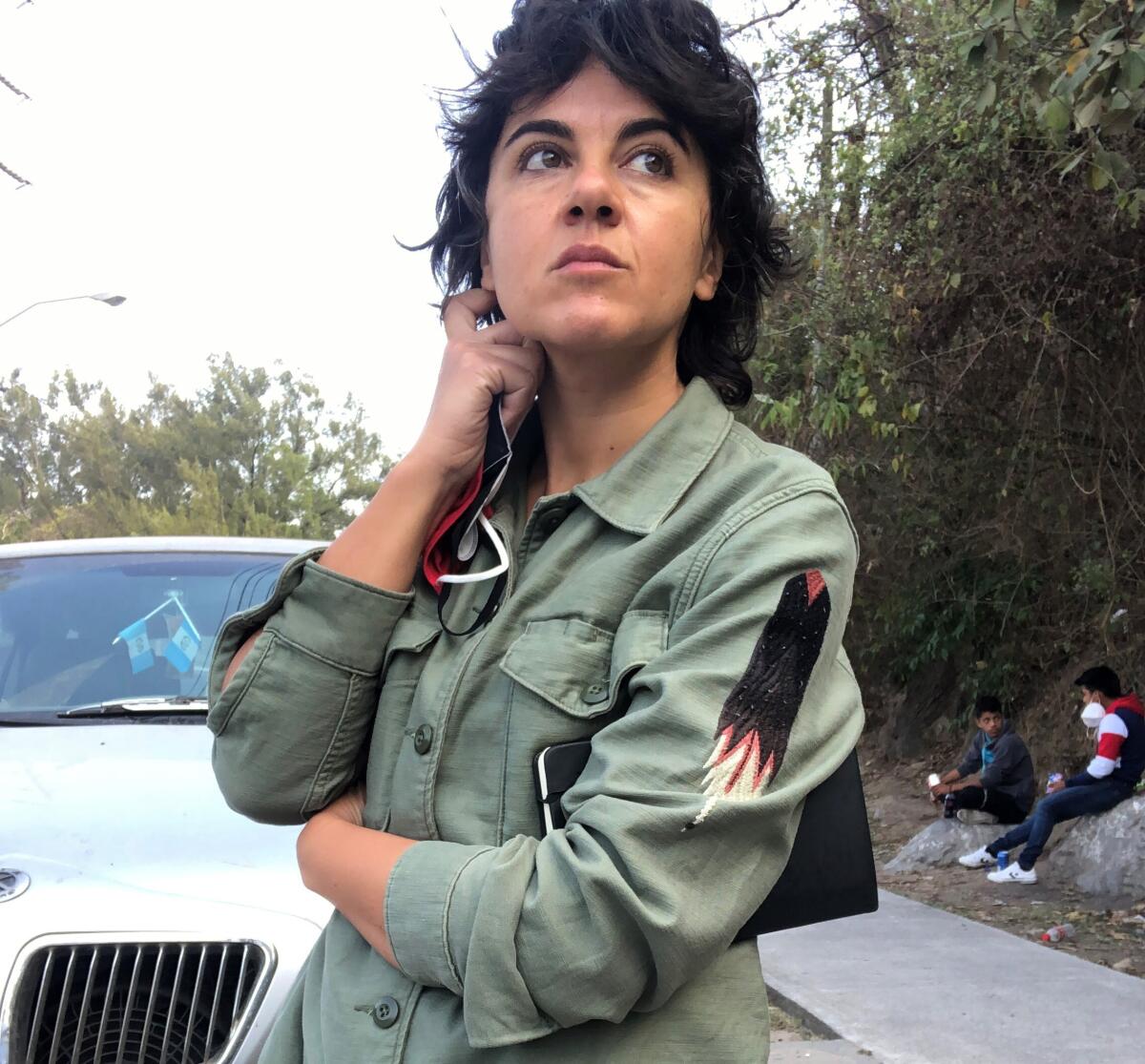‘Narcas’ author Deborah Bonello on the dangerous fascination of Latin American drug cartels

- Share via
In her new book, “Narcas: The Secret Rise of Women in Latin America’s Cartels,” journalist Deborah Bonello introduces readers to the powerful women who run some of the region’s most violent and profitable drug gangs.
Few of these women are household names like those of male cartel leaders Joaquín “El Chapo” Guzmán and the late Pablo Escobar. And even fewer resemble the glamorous femmes fatales that populate TV and film melodramas about the narco world.
Today, the Los Angeles Times en Español and the Los Angeles Times are publishing an excerpt of the book in Spanish and English.
Bonello, a veteran journalist and editorial director for Latin America at Vice World News, has covered organized crime and criminal syndicates, particularly the drug trade, for nearly two decades. She has freelanced for the Times, where she was a special correspondent based in Mexico City, as well as for the BBC, the Guardian and the Telegraph.
Bonello recently discussed the motivation and reporting behind her book with The Los and the Los Angeles Times en Español. The following conversation has been edited for clarity and length.
How long have you been writing about narco culture in Latin America?
Narco culture and the narco world has been a part of my beat since I got to Latin America in 2006. Because that was when the then-president of Mexico, Felipe Calderón, launched Mexico’s “drug war,” unleashing the Mexican military against the cartels. And since then, violence in Mexico has exploded.
After reporting general news, I moved to InSight Crime, a think tank that specializes in organized crime in Latin America. So I got a fast-track understanding of the regional dynamics, which I think are really important in order to understand the bigger picture in Latin America. And the culture around the narco business is super-important, because there’s this tendency to see it in very binary terms of good guys versus bad guys, i.e. governments are the good guys and traffickers are the bad guys.
But it’s important to remember what an aspirational culture it is. Joaquín “El Chapo” Guzmán and Pablo Escobar are viewed by a lot of people as Robin Hood-esque figures who, despite the odds, have enriched themselves and become empowered in a system where it’s hard to find any kind of social mobility if you’re an impoverished campesino.
So I think that’s the aspirational culture, and that’s kind of gotten onto steroids with social media. And this aspirational look is incredibly powerful with women.

Why did you decide to focus on women in the drug trade?
As a woman covering organized crime, I was usually surrounded by men covering organized crime — men who I respect deeply and who have taught me a lot. But I did feel like they weren’t even embarrassed to admit that there were no women in their books. And for me, that sort of posed the question of “Well, are there no women in your books because there are no women in organized crime? Or are there no women in your books because you’re not really looking for them?”
A lot of the research that would come out around women in organized crime painted them as victims of sex trafficking or “mules” who were forced to carry drugs. And I just had this feeling that it really couldn’t be that simple. Certainly, there was a bit more visibility in terms of the prostitution chains, of women becoming empowered — of course, women who had probably initially been trafficked themselves but then rising to become these very powerful matriarchs and sort of like a “madame” who handles the brothel.
Let’s not forget that drug cartels are not ideological organizations. They’re not a terrorist organization that has at its heart some kind of religious ideology or goal. The cartels are capitalist organizations, and I think if they can see that women are going to do as good a job as men, they’re not going to say “no” because of some sort of antifemale bias.
You mentioned the regional dynamics of the narco world. What’s important to understand about that context?
I would say that in a lot of Mexico, Colombia and some parts of Central America, and increasingly Venezuela, criminal armies — I think that’s best word for them — are sort of alternative governments. And these organizations, who are heavily armed and well-financed by drug profits, are challenging the state. Not only are they filling in these spaces of need that communities have, in terms of providing social services because the state is completely absent, but they’re also kind of laying down the law the way they see fit.
Like in Honduras, where one of the women in my book, Digna Valle, was based — her family was paying for police trucks. Of course, the consequence of that is the police do their bidding and are kind of their enforcers. Organized crime co-opts a lot of state functions, such as the police and sometimes the military, to fulfill their own needs.
But the other part is the endemic, grinding poverty and the corruption. Central America is a great example of this — especially as the United States is facing down this constant, seemingly unsolvable immigration problem. The reason so many people are leaving Honduras is in part because the cocaine trade has corrupted all levels of government, right up to its president, who as you know was extradited to the U.S. last year — Juan Orlando Hernández. His brother has already been convicted and sentenced to life in prison in the U.S. for his role in the cocaine trade.
Often, when I go to Honduras, I’m surprised that the whole country hasn’t left. There are parts of the country that just feel like there’s very little hope for improvement, and the justice system is just completely overwhelmed and inefficient. Going to prison is not a rehabilitation process. Some NGOs now call Latin America’s prison systems a university for organized crime, because you might go in there for some sort of small offense and come out ready to commit a much bigger one.
So there are systemic problems: the poverty, the corruption, the nonworking institutions that are driving immigration. And yet I feel like the conversation around immigration, especially from the U.S., is essentially, “Stay home.” And there’s been all these efforts to tackle corruption and the drug trade. But the drug war in Latin America remains the same, basically, no matter who is in the White House.

Mexico repeatedly has been ranked the most dangerous country in the world to be a reporter, dating from the mid-2000s. How dangerous has this work been for you?
I think the perception of how dangerous it is is probably greater than how dangerous it has been. A lot of the scenes and the detail in my book came out of court transcripts and court documents. That said, I did spend a lot of time in Central America and Mexico trying to track down as much information as I could about the women. With the lack of documentation in Mexico and Central America, I found it really hard to find women that I could actually follow up on. So I chose the ones who had already been through the U.S. justice system recently.
So the women I chose to focus on were women I could find enough information about. And so when I went to Honduras to find out more about Digna Valle, as I write in the book, I ended up coming face-to-face with her on a video call. And she had said no to an interview with me several times. So I did have a moment of thinking, “Is she going to realize that I’m that pesky person who she said no to twice, and sort of lose her cool with me?”
I think I also have a low-level … I don’t want to call it a psychosis. Maybe “paranoia” is more the right word, just having covered the drug trade for such a long time, I think I’m sort of hyper-aware. And I think that, perhaps, increases my levels of anxiety. So since the book came out, I’ve had a little pushback from some of the women, and I find I have a very low tolerance now for watching violence on television. I think my sensitivity to violence is very present.
But I’m not sure how much of that is actually real. And so when some of the women reached out — and I totally stand by the reporting — some of the stuff they just don’t like. They don’t want people to know these things about them. And it doesn’t feel pleasant to receive angry texts from people you know who’ve been connected to really violent organizations. But at the same, they’ve all been through the U.S. justice system, a lot of them are trying to get visas to stay in the U.S. I’m not going to flatter myself that they’re going to jeopardize all of that in some sort of spiteful, vengeful act. I just don’t think it’s that big a deal for them, ultimately.
To really be in the cross-hairs — and I think it’s why Mexican reporters are targeted far more than foreign reporters — I think you have to challenge their business interests close up. And I don’t think any of my reporting does that, because most of these women are now out of circulation. I think it’s very different if you’re writing up close, for example, about the Chapitos and their fentanyl business right now, which is extremely in the cross-hairs of the U.S. government.
You come from Malta, you were raised in England, but you’ve lived in Mexico since 2006. You have two sons who were born in Mexico and are being raised there. Apart from your work, what has kept you there?
At a very young age, I got used to being the outsider. When I left Malta and came to England, I was the girl with the funny accent and brown skin. And when I went back to Malta, I was Maltese, but I never spoke Maltese, and to them I sounded English. Growing up in 1980s England was very different to growing up in England now. And then Mexico, it’s very hard to explain but I just had chemistry with it as soon as I arrived.
I’m still totally fascinated by the story. My dad asked me this question earlier this week, actually, and I think the fascination with the drug trade, especially — there’s something about that world that feels very visceral. You get a very particular view of human nature. It’s kind of like the gloves are off, you know? So much of life these days is very sanitized and edited and curated by social media. In the crime world, you see all dimensions of human nature, rather than just the highlights. And it’s cruel and brutal, yes, but there’s also something that you can’t really edit away. It is what it is.
More to Read
Sign up for our Book Club newsletter
Get the latest news, events and more from the Los Angeles Times Book Club, and help us get L.A. reading and talking.
You may occasionally receive promotional content from the Los Angeles Times.










